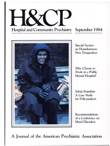The Journey of Sylvia Frumkin: A Case Study for Policymakers
Abstract
Unfortunately Miss Frumkin's story is not unique. There are an estimated 1.7 to 2.4 million chronically mentally ill persons in the United States. Like Miss Frumkin, many have drifted in and out of hospitals as the symptoms of chronic mental illness fluctuate unpredictably. They have failed to find a caretaker or treatment setting that will assume primary responsibility for their care. They have fallen between the cracks of different agencies when seeking help in the community.
They are taking various kinds of antipsychotic drugs to help control the symptoms of chronic mental illness and are developing adverse effects. They are leading lonely marginal lives in but not of the community. They are becoming overwhelmed by the cost of the illness. They are experiencing frustration and despair in attempting to deal with an illness "stronger than I am," in Miss Frumkin's words.
Policymakers can learn a great deal from the personal experiences of Miss Frumkin and her family. Her story clearly illustrates the profound impact of chronic mental illness on patients, families, and communities, as well as the catastrophic costs involved in providing care.
Access content
To read the fulltext, please use one of the options below to sign in or purchase access.- Personal login
- Institutional Login
- Sign in via OpenAthens
- Register for access
-
Please login/register if you wish to pair your device and check access availability.
Not a subscriber?
PsychiatryOnline subscription options offer access to the DSM-5 library, books, journals, CME, and patient resources. This all-in-one virtual library provides psychiatrists and mental health professionals with key resources for diagnosis, treatment, research, and professional development.
Need more help? PsychiatryOnline Customer Service may be reached by emailing [email protected] or by calling 800-368-5777 (in the U.S.) or 703-907-7322 (outside the U.S.).



